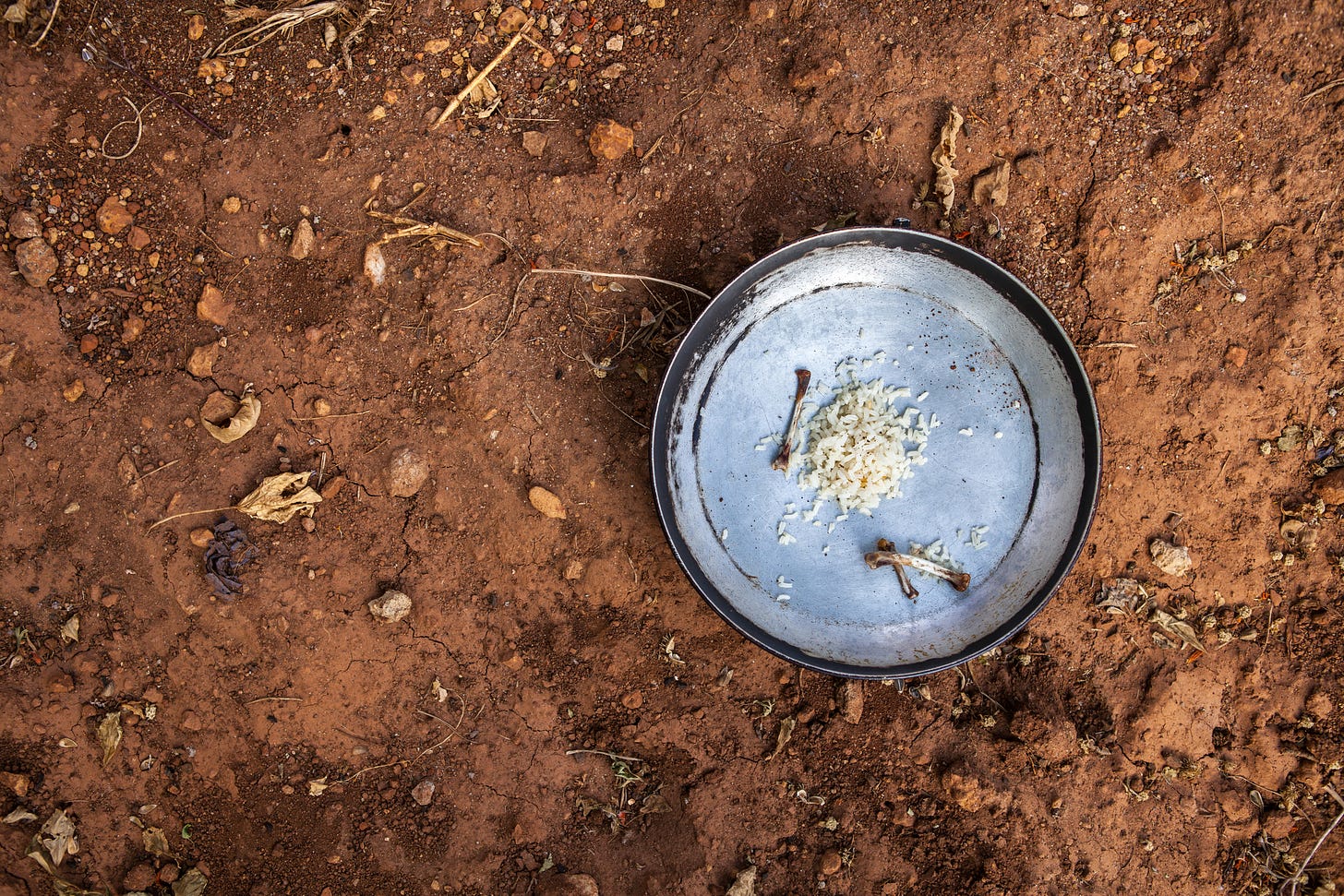Should We Be Allowed to Profit From Hunger?
A newsletter about food systems, climate change and everything connected to them
I said last week I hope to share more about an investigation I’ve been involved in. Well, here it is. Buckle up because it is infuriating. Or at least, it should be.
Reine used to be a normal 22-year-old, studying, going out for coffee with friends, indulging in her favourite sweet - chocolate - from time to time and looking forward to what the future might hold.
Things started changing over two years ago, when economic downturn hit Lebanon, slashing the value of its currency and raising the prices of food and fuel.
Then Russia invaded Ukraine and Lebanon, a country that imports most of its food and relies, including nearly 60% of its wheat from Ukraine, was in more trouble than ever.
“Meat costs a fortune here in Lebanon. We used to eat it every day, now maybe once per week. The ingredients we buy for our home are a totally different quality,” Reine, a university graduate, told us.
Her father is a business owner but they are now struggling. She has given up chocolate and is anxious about the future.
“I’m afraid of not having a new job because I need to be productive, to help my family and myself.”
Others fare even worse. Like a Lebanese father-of-four who is now relying on food banks to feed his family or an Egyptian mother-of-five who recently developed anaemia after she stopped eating nutritious foods.
They are the real-world victims of the crippling hikes in food prices we’re seeing today. People for whom a 5% rise in prices could spell the difference between having three square meals a day and forgoing at least one of the meals.
This is because they are already spending a large chunk of their income on food and any jump in price, no matter how small, will reduce their disposable income. And it’s not like they can choose not to eat. We *all* have to eat. So their options are to eat less and/or eat less often. Often, they have to do both.
But food prices are going up at a crazy rate. A new analysis published today by Action Aid said local communities in 13 countries are having to pay double, triple and sometimes nearly four times as much for food, fuel and fertiliser.
Hunger Profiteers
The situation should worry all of us, regardless of where we live and what our income levels are. Food prices have been rising since last year, fueled by factors including COVID-19, climate pressures and a supply chain crunch. Acute hunger levels in 2021 were nearly double that of 2016, as a result of the pandemic, conflicts, weather disasters and economic slowdown.
Russia’s invasion of Ukraine has exacerbated the issue and two months ago, the Food Systems Newsroom at Lighthouse Reports, which I’m proud to be a part of, decided to investigate if there is anyone looking to profit from this situation.
We looked at what is happening currently in commodity markets and if there are any signs of “excessive speculation” (when speculators, instead of market fundamentals such as demand and supply are setting the price). We tracked money flows into commodity index funds, especially wheat, and whether there’s anything to stop such behaviour.
Simply put, the investigation is about those who are profiting from hunger.
What did we find?
Well, we found a huge influx of investor cash into specialist agricultural funds, much of it coming from speculators who have little to do with the physical production or distribution of wheat. These are investors who have jumped into the market because they see an opportunity to make a profit.
Who are they? Often these are powerful institutional investors such as hedge funds, pension funds and investment banks. The thread below explains clearly what we found and its implications, which are extremely concerning. It’s a little long but I really urge you to read through the whole thing.
We’ve also done a short-write up on Lighthouse Reports website which you can find here.
How do we know “excessive speculation” is contributing to the crisis?
We don’t. But we also don’t know that they aren’t. And that’s part of the problem.
We have publicly available data that shows speculators’ share of the market has increased dramatically over the past few weeks. We know there isn’t a shortage of food supply, at least not yet.
We looked at cereal production data and it was very clear production levels have been fairly steady - and even increased slightly - over the past 15 years. Yet food prices have been volatile during the same period, which means these fluctuations are not caused by supply shortages.
We also know the price of wheat has jumped. Soon after the invasion of Ukraine, wheat futures prices shot up so high that some grain elevators in the US stopped buying futures contracts from farmers because they didn’t think the high prices were realistic. Experts told us this situation, where the cash and futures prices are not converging, is a telltale sign of factors beyond supply and demand at play.
But the problem is it is really really difficult to have a clear picture of whether and to what extent the current crisis is speculation-driven because there is a lack of data and transparency. A special report that came out today from IPES-Food (International Panel of Experts on Sustainable Food Systems), in fact said the “opaque, dysfunctional and speculation-prone grain markets” is one of four key weaknesses in our food systems.
“‘Excessive speculation’ can make upward swings higher than would have been the case based on supply and demand conditions alone. Where for other commodities this may simply result in bigger gains/losses for investors, for food this translates into higher real-world prices that affect the world’s poorest people,” the report said.
This is a bit of a chicken-and-egg situation. You can’t prove definitively it is happening, and therefore there is no consensus, and therefore nothing is done to regulate such behaviour or improve transparency. So we don’t have the data needed to prove it is definitely happening. Ergo, this continues.
Science vs. Life
Lukas Kornher, a researcher at University of Bonn, co-authored a recent paper which analysed current market data and came to this conclusion.
“At this time, we cannot rule out the risk that excessive speculation already contributes to food price volatility and amplified spikes.”
Sounds wishy-washy? Well, it’s actually quite important, because the researchers are saying you cannot say excessive speculation doesn’t play a role.
But Lukas suggests taking a different approach when it comes to discussing “excessive speculation” in the food markets - reverse the practice.
Scientific literature is all about proving something happened, that there is causation, right? But here we’re talking about something as fundamental as food - literally the difference between life and death - so we should be looking at proving”excessive speculation” is NOT driving food prices, instead of the other way around.
Why isn’t anything being done?
Not for a lack of trying.
In the aftermath of the 2007-2008 Food Price Crisis, when prices of rice jumped by 180% and wheat by 120%, pushing at least 40 million people into hunger, there was concerted campaigning by the civil society and the NGOs including Oxfam, Friends of the Earth, SOMO, Global Justice Now to regulate the financial markets.
Even the then-French President Nicolas Sarkozy got into the act, urging G-20 to regulate commodities markets.
But guess what? U.S, Brazil and Canada publicly opposed the French push as there was no clear consensus if speculation played a role in the crisis. Industry groups also lobbied against the new rules and some even resorted to lawsuits.
The results? New regulations - the Dodd-Frank Act on financial reform in the U.S. and MiFID II in Europe - that established limits but did not go far enough to tackle the structural problems that allowed “excessive speculation” to happen in the first place.
What’s even more upsetting is that in 2020, governments on both sides of the Atlantic relaxed the rules instead of tightening them.
And now here we are - facing the third major food crisis in 15 years.
Millions will go hungry as a result. But hey, the profit was good while it lasted yeah?
Further reading
Article in The Wire (India)
Article in Der Spiegel (Germany, behind a paywall)
Article in Follow The Money (Netherlands)
A new issue of The Continent (Africa) with a story on this will be out May 7, Saturday
Another Perfect Storm? (from IPES-Food)
ZEF Policy Brief on speculation (University of Bonn)
The Hunger Makers (published in 2011)
Despite the news, I hope you have a great weekend! Please feel free to share this post and send tips and thoughts on twitter @thinink, to my LinkedIn page or via e-mail thin@thin-ink.net.






